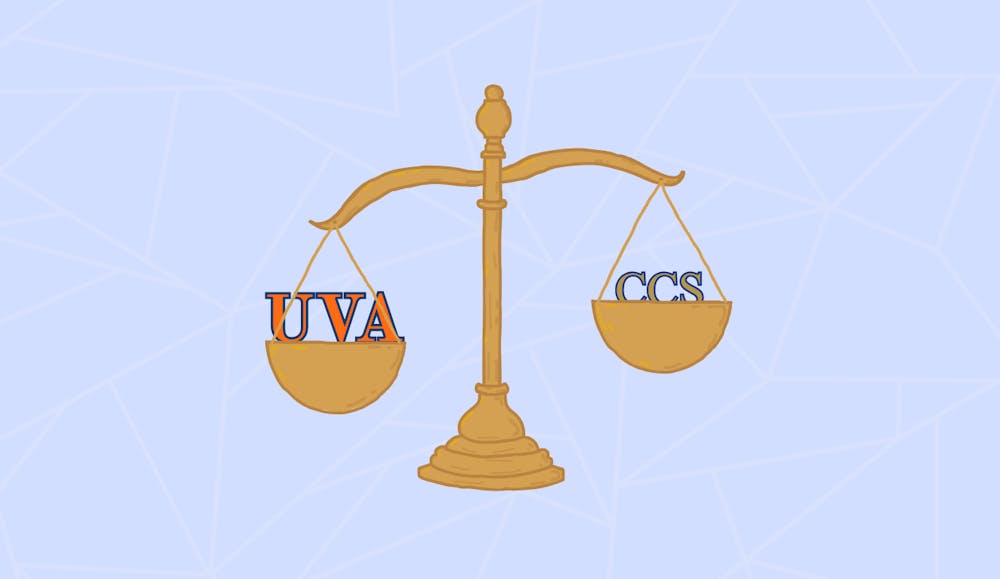Although Charlottesville is home to one of the world’s most celebrated educational institutions, the city’s own public schools are running out of space, staff and support. For years, Charlottesville’s public schools have endured overcrowded classrooms, limited capacity for special education programs and persistent staffing shortages 一 failures that prevent the school system from adequately meeting even the most basic educational needs of its students. This reality can be seen in the fact that CCS students consistently score below the state average on Standards of Learning assessments. What makes this reality especially troubling is that the University, with all of its power and reputation, has done an incredibly mediocre job at supporting community needs.
Consider this — the University of Virginia Foundation, the private real estate arm that manages property on behalf of the University, is the largest non-public property holder in Charlottesville. The University itself, as a state institution, also holds extensive amounts of land. Yet, both the Foundation and the University enjoy tax-exempt status, meaning that together they pay not a single dime of property tax on the 97 vast swaths of Charlottesville land that they own and occupy. While this exemption is a governmentally recognized mechanism intended to support universities’ educational missions, it comes at a steep cost to the city of Charlottesville.
If the University did pay property taxes on its land, its bill would amount to more than $20 million annually. That is a sum of money that could transform local schools by expanding vital special education programs, hiring more teachers and reducing class sizes. Instead, the University continues to unintentionally, yet unashamedly, benefit from this tax-exempt arrangement and contribute little in support, while the city’s students shoulder the consequences.
However, the inequity extends beyond just the lost revenue from city taxes. Earlier this year, the Department of Education reversed its decision to grant the former Federal Executive Institute property to CCS and instead gave it to the University. The land, located on Emmet Street, was a 14-acre beacon of hope for CCS that was intended to be a location for alternative programs, preschools and special education classrooms. Instead, without warning, the property was taken back and transferred to the University, which will now use it for its ROTC and School of Continuing and Professional Studies programs. The swap revealed a broader trend of CCS needs coming second to the University, with countless opportunities for public school students being lost to the institution looming over them. Though the University did not orchestrate the reversal, the end result remains the same.
So, when will the educational needs of Charlottesville’s children finally come first?
The University has a civic and moral responsibility to help Charlottesville schools. Its presence within the city brings undeniable benefits, but at the same time, its tax-exempt status deprives the city of millions of dollars, leaving public schools under-resourced. The University, therefore, has an ethical responsibility to mitigate the negative effects of its own presence and provide remediation for infrastructure, housing and services that are tangibly impacted. And if claiming a core mission of advancing knowledge, learning and public good, then those commitments must extend beyond just Grounds to the city’s children as well.
It is important to recognize that the University does play a significant role in Charlottesville’s social and economic life, but current projects fail to live up to their potential for significant support. The Buford Middle lab school is a collaborative partnership between the University’s School of Education and Human Development, School of Engineering and Applied Science and others, developing a computer-science-focused lab for middle school students in CCS. The program provides middle schoolers with an early opportunity to experience computational thinking, effectively integrating hands-on STEM experiences into schools. While this program is valuable, one lab school and scattered giving campaigns do not offset the divide between the privilege of a prestigious institution and the educational needs of an entire city.
Most recently, the University has made progress in the right direction by deciding to lease the five-acre Oak Lawn property to CCS. While this gesture is encouraging, it neither addresses the larger challenges facing Charlottesville schools nor compensates for the nine extra acres the University gained through the FEI property transfer. What is necessary now is foundational, intentional and large-scale efforts that directly address the immediate needs of CCS.
There are concrete ways to reshape the University’s relationship with Charlottesville, reflecting not just a shared geography but also a shared responsibility. The University could enter into a Payment in Lieu of Taxes agreement, as many other wealthy universities have done, providing consistent agreed-upon financial contributions to the city in place of property taxes. It could expand long-term fundraising campaigns aimed at structural improvements. It could create continuous teacher pipelines to support active educators. But whatever path of action it takes, its collaboration with public schools needs to be sustained and systemic rather than symbolic.
The University may own land in Charlottesville, but until it begins seriously investing in the children who live here, it will remain a neighbor in name only. It is time for the University to turn its power, privilege and resources into something meaningful for the students of the city that it calls home.
Lucy Duttenhofer is an opinion columnist who writes about academics for The Cavalier Daily. She can be reached at opinion@cavalierdaily.com.
The opinions expressed in this column are not necessarily those of The Cavalier Daily. Columns represent the views of the authors alone.







